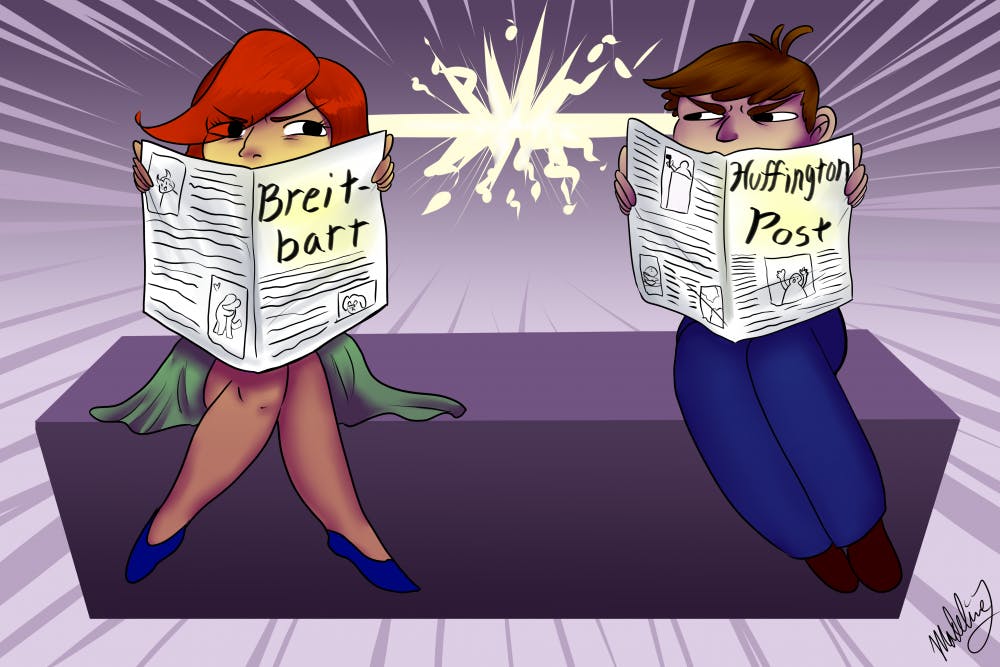Where do you stand on the political aisle? If you are reading this, you most likely know.
Here at ASU we are lucky enough to have a diversity of opinions, so much so that in a time where it is widely believed by those on the right that right-wing voices are silenced.
Conservative writer George Will recently highlighted that the School of Civic and Economic Thought and Leadership at ASU breaks this mold.
In my time taking political science and international relations courses, I’ve had teachers who think free-market capitalism is the best way to go about things, and I’ve had teachers who are a few pegs closer to Noam Chomsky. And the students in these classes reflect these beliefs as well.
If you don’t stick exclusively to your bubble, it’s easy to see that not every student here is a bleeding heart liberal.
As Americans and academically-minded people, we should respect these differences of opinion. What I don’t understand, is why that respect is not given to media that takes a political slant.
That's why I think it's important that, if you consume a lot of media, that you keep a healthy and balanced diet. Read the New York Times, but also read the National Review and Mother Jones. It will expose you to a lot of great writers and content that you may not usually see, as well as news stories you would not have heard about otherwise.
Objectivity is certainly a good thing — I don’t think any journalist should selectively pick or alter facts. What people ignore is that while objective and neutral media is extremely important, liberal and conservative news organizations certainly have their place in the landscape as well.
Like any art form, there are going to be variances when it comes to journalism. At its core journalism is about seeing things and reporting them. What you report and how you do it is up to the individual journalist and their media company.
I personally like journalism with a bit of the writer’s opinion in it. I think that it makes for more interesting and dynamic reading. While educating you about the facts, it can also tell a story that I often find that an Associated Press wire can’t — one with emotions, and beliefs, and humanity.
Mark Ramirez is an associate professor of the ASU School of Politics and Global Studies. He is currently teaching a special topics course titled Political Psychology.
Ramirez says that many choose to stay in their “media bubbles,” reading only conservative sites if they are conservative and vice versa. He says this is present not just in the media they consume, but in their personal lives, in a concept called “selective exposure.”
“We see this not just with media, but who your friends are, who you engage and decide to talk about politics with — people are more likely to talk about politics with someone who agrees with them than someone who they know is going to disagree with them,” Ramirez said.
He says such information helps reinforce people's beliefs, as well as avoid cognitive dissonance.
"If you hear information that reinforces your beliefs, this contributes to your own self-esteem and your own self-image,” Ramirez said. “You feel good about yourself when your candidate wins or when your positions or preferences are vindicated by someone on TV."
Ramirez says that it is not just about reading media or hearing the opinions from the other side but seeking to understand them.
"It would be great if people could realize the biases of their own sort of political position. Realize how sort of stubborn people are, and sort of fixated in their ways, and take the time to understand what the other side is arguing,” Ramirez said.
Other than serving as interesting reads that are good alternatives to standard journalism writing, liberal and conservative news organizations can help you see what the opposing side believes, and more importantly why they feel that way.
It can also make you realize that these groups aren't as homogeneous as we want to believe. Liberals may know about the divide between the progressive and "establishment" wings of the Democratic Party, but if you didn't go on Breitbart would you know about the absolute disdain that the Republican Party has toward Paul Ryan?
If your Facebook feed is mostly reinforcing the views you already have about things, whether it be Think Progress or Fox News, go like a page with an opposing view. Get out of your bubble, and you might just learn a little bit about yourself and others.
Reach the columnist at Marinodavidjr@gmail.com or follow @Marinodavidjr on Twitter.
Editor’s note: The opinions presented in this column are the author’s and do not imply any endorsement from The State Press or its editors.
Want to join the conversation? Send an email to opiniondesk.statepress@gmail.com. Keep letters under 500 words and be sure to include your university affiliation. Anonymity will not be granted.
Like The State Press on Facebook and follow @statepress on Twitter.




